#good omens timefucks
Explore tagged Tumblr posts
Text
5 Good Omens Timefucks that Haunt Me
1.
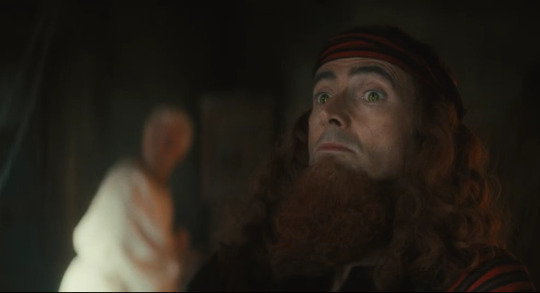
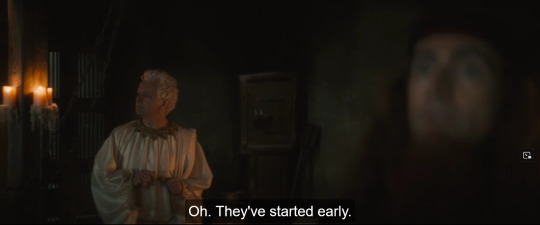
Why is this here? Why is this line included? Is it just to add texture, to imply that larger world of corporate fascism of which Crowley and Aziraphale are subjects and victims and little worker bees? If so, why "They've started early" specifically? Why not "I wouldn't have expected that shrub to be the first to go" or "Aw, I liked that rock formation"?
Crawly doesn't make this comment in an offhand way: he sounds a bit taken aback and not thrilled that things have kicked off sooner than he anticipated. But it doesn't ultimately seem to make any difference to this scene, so why do we, the audience, need to know Hell started early?
2.


This one I'm not as confident will turn out to be significant, because iirc it appears in the book, which was a complete story when written, and because it serves a narrative purpose: it puts Agnes Nutter in charge of the situation, not her murderers. By backfooting Witchfinder Major Pulsifer, Agnes startles him enough she's able to walk past him without Pulsifer seizing her and discovering the extra 80 lbs of gunpowder and roofing nails in her skirts.
But. Agnes Nutter's sense of time is Nice and Accurate, and she notices the witchburning party are late and remarks on it to herself before she says anything to Pulsifer. So assuming a few minutes to position Agnes, tie her to the stake, and read the charges and conviction against her, Pulsifer and Agnes' neighbors are 12-15 minutes later than they should be. Why?
If the book answers this question, I don't recall; the show does not. And again, it seems to make no ultimate difference to this scene.
I'm not saying this was even purposely included in S1 as a timefuck. I am suggesting that as Gaiman seems to be fucking with time or timelines in this story, even if he and Pratchett didn't plan it like this when discussing the sequel, a retcon is hardly out of the question.
3.
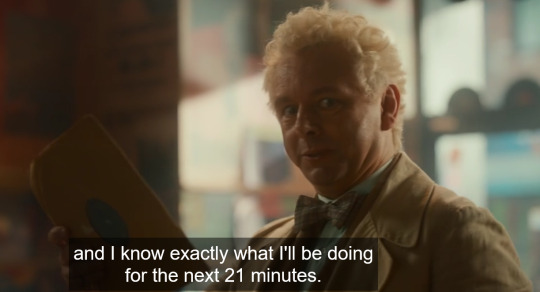
As others have pointed out, Shostakovich's Symphony No. 5 is 45-55 minutes long. If you're listening to it on 78s instead of LPs because you are a CRAZY PERSON, it's going to take you more like 1 hour 5 minutes, because one side of a 78 holds, at most, 5 minutes of music, so every 5 minutes you have to get up and flip or switch the record.
Shostakovich wrote his 5th symphony in response to criticism in the state newspaper (possibly penned by Stalin himself) that his previous work didn't suck the Communist Party's dick hard enough--the kind of criticism that put him in danger of being sent to prison or killed. At the time it was first performed in 1937, Symphony No. 5 was considered a massive triumph, walking the line perfectly between Shostakovich's artistic standards and the Communist Party's demands of him.
The choice is symbolically significant, but it's a symphony, so whoever's censoring it isn't censoring lyrics or information. Again, why? Why is a 45-55-minute symphony only 21 minutes long? What did the time thief do with the 24-34 minutes?
4.
Here's the rug that covers the portal to Heaven in Episode 1:

Here's the rug in Ep. 2:
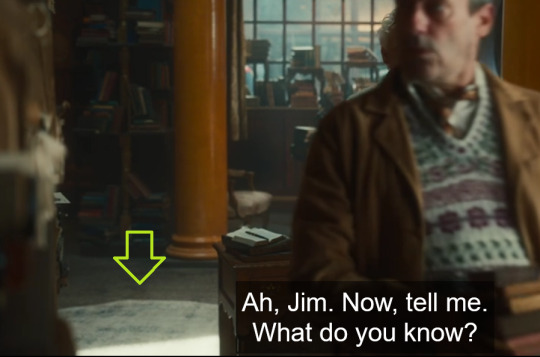
Aziraphale does not change this rug for the party. We know this bc we see it in Episode 5 when Mrs Sandwich enters the bookshop and the party is in full swing:

Now here's Aziraphale moving the circular rug to expose the portal to Heaven:
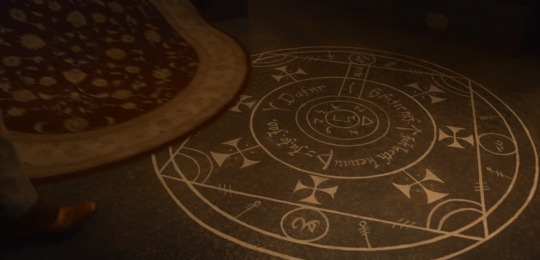
But here's Crowley, putting the rug back:

Why are there two different rugs?
5.
Every end credits track has the first line of "Everyday" embedded in it But after the line from "Everyday," at the end of Episode 4, the theme skips twice like a vinyl record, and then is stopped by whoever controls the turntable and restarted, with several seconds of music having been skipped over.
This is not the first time it has mattered to a character in Good Omens what we in the audience see and hear. I argue here that God asks Aziraphale what he did with the flaming sword She gave him in order to show us the audience who Aziraphale is. God also addresses us the audience directly in S1, not only narrating about characters omnisciently but speaking to us about Herself in first person.
Now we evidently have a second character who has gone meta and is changing what we the audience experience of this story, and--indications are good--the story itself.
#good omens#good omens s2#good omens meta#good omens timefucks#good omens chronology#good omens discontinuity#good omens as metafiction
665 notes
·
View notes
Text
::screaming::
So were Neil and Douglas ever going to tell anyone that there were two suns at the end of episode 6…?
The ineffable detective agency has been busy lately with codes and signals, so I thought I’d just pop on and howl into the void with a few things.
Like the fact that if these two shots were supposed to be happening simultaneously for real, then SoHo’s got a little physics problem.




The southeast end of the street AND the north west end of Whickeber Street have a sun rising/setting behind them at the same time. Look at the direction of the light and shadow on the cars and the road, and how the sun is always the both of their backs. While they look towards the other. On opposite sides of the road.
I’m not saying that it’s impossible that it’s an error or an artistic choice, but with the amount of clues and hints that have been dropped by the creators about light I think it’s pretty unlikely. But it gets worse.
look at the bookshop during the angel and demon conference, and during the final 15 argument.
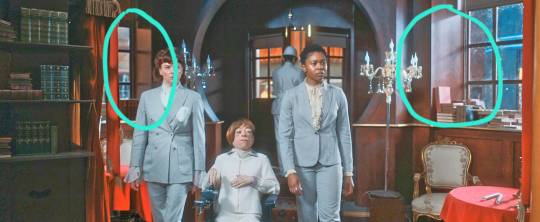
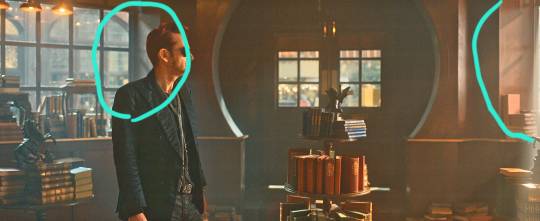
The sunlight starts streaming in both both sides while they’re still in the bookshop. Compare with when we see the bookshop at other times throughout the earlier episodes. It does not look like this.

So are we playing 4D chess with the sun now?
Members who want to share our confusion with the Good Omens fandom include: @bbbitchvibbbez @embracing-the-ineffable @kimberleyjean @maufungi @noneorother @theastrophysicistnextdoor @thebluestgreen
#good omens#good omens meta#good omens 2#good omens s2#good omens discontinuities#good omens timefucks
304 notes
·
View notes
Text
Time and memory
This is more a pondering out loud than any theory or idea I necessarily subscribe to at this point, but there's something about time and memory and the wackiness of both through season 2 that has me thinking and full disclosure: This is not a complete thought.
I have had this post sitting in my drafts for about a month because there's some connection my brain is almost making, but can't quite. And during that time a whole lot of ppl have delved further into the time and set/prop inconsistencies, so this post is a little bit sharing a whole lot of the metas I've had the pleasure of reading, and also an attempt to share my own thoughts on it all.
There are amazing posts delving into the time inconsistencies already (like The ineffable discontinuity of time in ALL of Good Omens season 2? and the other work @embracing-the-ineffable has linked in their pinned post that explores this and @indigovigilance's look at Continuity errors is another one).
Then @cobragardens points out these extremely sus time-related situations in 5 Good Omens Timefucks that Haunt me
Then others have pointed out inconsistencies in prop placement, costuming etc, such as They are out of order by @maufungi and @purplewillowchicken's observations about Crowley's chair in the bookshop
But then, THEN, Neil answered an ask about Crowley's knowledge that hand washing would become all the rage during the Edinburgh flashback and his response here (incl. the excerpt "Either [Crowley] has an understanding of science and the world, or he has visions of the future. Or he read up on the ineffable planning a long time ago. Your call") could indeed be very Gaiman-esque teasing or it perhaps a little bit of a hint.
When you take in how many time discrepancies or inconsistencies (whether this is prop or costume inconsistency/changes or timeline ones) there are throughout season 2 and consider that this is a show that is deliberate and fastidious in it's inclusion/exclusion of any details, it has to make you wonder.
Also, in the book of Good Omens, Crowley's watch shows the time for Another place as, "it's always too late" and it's stuck on one time. But in the series, we've never had reference to his watch in this way and the line, "It's always too late" said by Crowley in season 2, is, to me at least, quite ominous, almost defeated, like it's something he contends with often.

There is something about the way he says that line that struck me on first viewing and continues to on every subsequent watch. It's not just that the meaning is a little ambiguous; too late because Aziraphale is already in danger? Too late because they've always been in danger and they're simply staying one step ahead? Too late because no matter what Crowley and Aziraphale do, they're part of a bigger plan that they have no control over or ability to slow down? All of the above?
The way Crowley says, "it's always too late" comes across as quite personal to me. Like he feels responsible. Or, if we're going to go with some timey-wimey bendy-wendy stuff, it's like he keeps falling short of preventing or achieving something he's being trying to achieve for a long time. He sounds deflated.
And yes, it could be the constant looking over his shoulder and never finding peace, absolutely. As I said right off the bat, I don't necessarily believe what I'm writing is true, but more of a fun little "what if?"
There have been theories about time loops and the idea that Crowley (or everyone) is stuck in a loop, and I could see how memory could come into that. I don't necessarily think Crowley's memory has been tampered with by Heaven or Hell, but the idea that being in a loop impacts memory, and that each time he goes around it shifts or alters memories depending on what has been changed etc, totally tracks.
Part of me thinks that playing around with time loops etc is a bit out of GO universe, but then I remember that Crowley stops time and that is pretty darn significant, so anything's possible?
So what I'm throwing into the mix is this - what if time and memory, specifically Crowley's, are somehow connected? More specifically, his involvement in the creation of nebulae aka space, sort of attached him to different timelines? Or allowed him to travel through time in different ways?
Yes, this is whackadoo, but he can stop time, possibly manipulate it, what if he can jump around in it too? What if, just like Adam resetting the Earth, essentially setting it on a new trajectory and timeline, Crowley finds himself in different timelines at different times, trying to get to the one where Earth is safe, he and Aziraphale are safe, where it's not too late?
And what if he's either not aware of it or doesn't know which timeline he's ever in until it is too late? And that's why he doesn't recognise Saraqael and Furfur. Or, what if he has indeed seen the future and is desperately trying to alter the past to avert whatever he's seen? But in doing so, any changes mean that present Crowley doesn't remember these angels and demons he doesn't recognise, because they are a result of trying to alter the outcomes of the future?
I think this is all far too sci-fi and quite unlikely but, if I was going to humour myself a little more, the comment Crowley makes to Maggie and Nina, that he and Aziraphale have been talking for "millions of years" - I always took it at him just exaggerating the time they've known one another to make a point (which, honestly, I still think is the case). But if I wanted to support my own out there idea, arguably, if Crowley was travelling back and forth through time, trying to do whatever he's trying to do, then perhaps he really does have millions of years of conversations with Aziraphale under his belt?
And that's why sometimes props are different or in different places - something's been altered in the timeline and it flows into the present. Then of course there's the idea that the Metatron or God or some entity is manipulating time and messing with everything, again, maybe *insert shrug emoji here*?
Though I do keep coming back to Neil's comment about Crowley having visions of the future. Perhaps it's not so much travelling through time, as being able to see through time? I mean, there's the whole scene that never happened with the dream of the bookshop standing alone amidst destruction and while it's never been said whose dream it was, if I was a betting person, my money would be on Crowley. Ya know, the one who has visions of the future. Because Earth destroyed while the bookshop still stands would certainly explain the "it's always too late" comment too.
So that's the end of my half formed not-really thought. It seems ridiculous to write such a long post about something I'm not particularly convinced about, but I certainly agree there's something funky going on with time and the memory thing bugs me because it's not consistent enough to be a memory wipe situation (I don't think), but it's been made obvious enough we're meant to notice. Either that, or Crowley is just being a smartass which, honestly, is far more likely.
#good omens meta#good omens#crowley#this is a rambly ramble that sort of says nothing in the end tbh#because I cannot for the life of me quite land this thought#al I know is that something is up with time#and my brain wants to know what it means
34 notes
·
View notes
Text
it's been 6 months since kovac game went on hiatus but we're finally picking up again in january!! new kovac lore under the cut
we lost two motley members (troll grump lou and pookah childling sadbh) and gained two more (redcap grump gale and a mystery nocker) so our st gave each of us an individual session where the world started to end > there was a crazy powerful unleashing of chronos > time rewound a week to July 7, 1969 and only the motley remembers. but! some things are different than the first July 7, like the disappearances of lou and sadbh.
kovac was with kier when time rewound, and he remembers too. between omens + memories kovac experienced during the timefuck and their following convos with kier they've unlocked a few memories from their past lives:
before they were changelings, kier and kovac were odin/the morrigan's ravens: thought (kier) and memory (kovac)
kier asked odin/the morrigan if they could change forms so they could experience the world differently, and s/he loved them and made them shapeshifters
they were immortal fae for thousands of years until the shattering, when they took up the changeling way
in every lifetime they find each other. depending on time and circumstances and their seemings, they're sometimes lovers, sometimes not; but they're always the most important person to the other, and they always fly home
in one of their first lifetimes together there was a child they looked after, and the three of them were a family. kovac can't remember her name but the memory of her face makes their heart ache
kovac has the True Love merit re: kier and in every lifetime they swear the same oath to each other. (we homebrewed this one, based on a combination of oaths for lovers + friendship + fealty)
there have been many lifetimes where they've broken other oaths for each other; in one, oathbreaker kovac went blind for a year and a day, and kier was their eyes all that time. that was the first lifetime when kovac's hair grew long enough to obscure their eyes
there was an early lifetime where kovac was older and kier kept dying too young; 4 of his lifetimes to 1 of theirs. since then kier has always been reincarnated first
they have known each others' True Names, though not yet in this life. kovac is still a childling
in the lifetime where kovac went blind, they were squire to another sidhe knight who used Sovereign to compel kovac to reveal kier's True Name to her. kovac unleashed chronos to rewind time to warn kier, breaking their oath of fealty to their house in the process. kovac went blind and they were both exiled. their ex-knight still possesses a bracelet she took from kovac, that kier gifted them in the lifetime with the forgotten child
in that lifetime kovac was also able to climb in and out of kier's shadow like that girl from the ring :)
there was a lifetime where kovac was forced to near-Undoing by a king, and kier swore an oath of vengeance to kill him. kovac's soothsaying foresaw that the king's allies would retaliate with cold iron, destroying kier's soul and separating them for good. he broke that oath for kovac, paying the price of facial scarring and the reputation of a coward for the rest of that lifetime
#it's about the love it's about the devotion it's about the unwavering commitment in every lifetime no matter how the dream shapes them#in this lifetime kier chrysalized at 8 and kovac not until he found them 17 years later#chewing through the bars of my enclosure#ctd#changeling ny 1969#faevens
8 notes
·
View notes
Text
In the right place
✨️AT THE RIGHT TIME✨️
I can’t believe I still notice new (at least new to me) things to get hung up on in GO. In this scene ⬇️ Crowley says to Nina: “Just for once in your life trust something.”

How does he know that? How does he know she never trusts anything? He doesn’t. At least not from the interactions we see on screen.
But we know that Crowley and Nina (and Aziraphale and Maggie) are set up to be quite similar.
For example: Before that Nina says to him that she’s going home to “drink herself senseless in an empty flat”. Probably exactly what Crowley would (will? 😭) do.
So my guess is: Crowley is assuming Nina never trusts anything, because he doesn’t.
He has been kicked out by heaven back when he was probably more trusting (“how much trouble can I get into just for asking a few questions”). And since then he always had to watch his back, because being on his own side put him in constant danger from hell (see whatever happened after Edinburgh that made him feel like he needed insurance).
And that also goes for his relationship with Aziraphale. From the very beginning the angel constantly rebuffs (or outright rejects) him (not admitting they’re friends, you go too fast for me, there is no our side etc.). Don’t get me wrong, Crowley trusts Aziraphale with his life. And I am sure he holds none of it against him (they both are victims of the circumstances). But he doesn’t trust that the “peaceful fragile existence” they have now will last.
Nina says as much to him. “You’re the hard bitten one who can never trust anyone ever again.”
Which brings us to the final 15. Crowley is ready to trust. To confess. But it doesn’t go that way and that probably doesn’t surprise him. He is resigned to the fact that things don’t work out for him. He had hoped of course (he is an optimist), but he is very used to “being the bad guy” (“Unforgivable that’s what I am”). He doesn’t trust himself to be enough.
I will cry now. Bye.
232 notes
·
View notes
Text
Requisitions didn't have a full legion of demons to spare but silver linings, Gaiman was kind enough to give the audience a creeping sense of dread and unease as a free bonus just for watching S2
Are there also two versions of the columns in front of the bookshop?
@embracing-the-ineffable has a great post about clue hunting and inconsistencies. The latest one they found, the coffee shop board appearing in the middle of a scene, was great. I'll also humbly propose a new one : that there are two versions of the columns in front of A.Z.Fell & co. Please bear with a stupid amount of screenshots with time codes to better show the context. Here is every appearance of the front door of the bookshop in episodic order. Episode 1


When we first see the bookshop in S2 and then when Jimbriel arrives for the first time (?) we get really clear shots of the pillars. There are two big marks on the right hand column in the second scene, but not in the first.
Episode 2



All clear for all of episode 2, no markings. Episode 3



At the opening in episode 3 we get a clean pillar, and from 39mins onwards when Crowley comes out to talk to Shax, it's dirty. Seems to be pretty consistent within scenes. Episode 4


Episode 4 is tricky because we're in the 1941 minisode for almost the whole episode. But inside of the minisode, the pillar is clean, and when Crowley is handing the boxes back, it's seems *maybe dirty*. Episode 5

Episode 5 is where we see the most of the pillars, and they are clean all the way up to the attack on the bookshop, including when all the traders enter the shop. Then a funny thing happens. We get a shot of Mrs.Cheng touching the right-hand pillar, and looking worried. She's the only person to touch the pillar all season besides the next bit.

During the evacuation, a demon leans on that pillar in the exact spot where it's dirty when we see the dirt in other episodes.

Episode 6


Episode 6 is also difficult because we barely see unobscured pillars even though people are coming in and out. However, you can catch that in the evacuation of Nina and Maggie by Crowley they are clean, and when they leave after advising Crowley I'm going to put that solidly in the *I see dirt* category, but it's unclear. So it seems that just like the clock shenanigans, the pillars are wacky mostly in episode 1 and episode 6. But it always goes from clean to dirty in every episode when it happens. I mean, there is every possibility that the actor fucked up the pillar in the attack scene and then they had to film scenes out of order for the rest of the series and just... didn't clean it? I dunno. Am I going a little Banana Shoelace Gorilla here? You can read my meta post "The end?" if you want to know where I think this all leads.
#what is even going on in this show#good omens#good omens s2#good omens 2#good omens timefucks#good omens meta#good omens discontinuity#good omens the bookshop columns
113 notes
·
View notes
Text
I think there's mounting evidence that Crowley, like the Metatron, has gone somewhat meta. He's aware that there are two versions of his story being told--either because the Metatron has rewound it and made it play again or because Crowley himself has re-run his own life like a level on a platformer--and he's fighting to change an outcome.
As a film person, this is the most f*cked up thing that happened in all of Good Omens

Forget about the final 15. If there's anything that should convince you that there's something really wack going on in season 2 of Good Omens it should be this cut. I literally gasped when I saw it for the first time. It's SO BAD from a technical perspective. Because you've probably been watching TV and movies your whole life, you might instinctively feel there's something weird happening with this cut, but not be able to put your finger on what it is.
I am here to tell you: they sacrificed continuity of action to *change the main character of the shot in the middle of the scene*. I won't do a full theory course on filmmaking here, but basically, when you want a fluid-feeling sequence of shots, especially when there's quite a lot of movement on screen, you have to conserve the direction and intention of that action to feel like it's all one take, and time is moving forward like we're used to in real life. Here, Crowley, Maggie and Nina all leave the Bookshop together, with Crowley and Maggie flanking Nina, who is centred in the shot. They are moving towards the camera as the camera is walking backwards, but at a slight curve camera-left. Crowley even turns his head and swings his arm left, making us feel like the camera will keep Nina center, and pan left or even cut wider to see more of the left of the street to watch them cross.
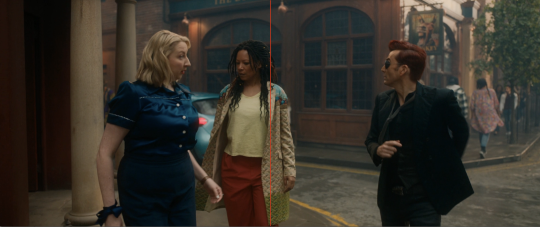

Well SURPRISE, idiots!
Forget everything you learned in film school because we're cutting immediately to a second medium length shot of the 3 characters from a slightly more camera-right perspective for no reason whatsoever, in the *opposite* direction of where the action is going, WHILE THAT ACTOR IS SPEAKING A LINE. This is so counterintuitive to the blocking of the scene that Maggie literally gets shoved out of frame while we're supposed to be reading her reaction to Crowley's dialogue. I can't stress enough how weird it is on a fundamental level. When a camera is moving and a character is talking, conserving continuity of action is THE ONE thing you don't sacrifice. It pulls people out of the moment, and makes it extra obvious that multiple takes have been stitched together. Which leads me to think that this is intentional, and sets up what I hinted to at the beginning of this whole "The More You Know" moment : Nina is the main character of the scene we're watching, until, suddenly, Crowley is. If you separated those two moments before and after the cut and watch them as two different scenes, you can see the camera following Nina and keeping her center before, but directly following Crowley and keeping him center *after* the cut. We've switched narrators in this moment. And to top it all off, they're making it pretty obvious that, while Nina is listening and reacting to both Crowley and Maggie, Crowley does not give a rat's ass about the two humans (not either not really in frame, or cut off behind him).
671 notes
·
View notes
Text
Either Gaiman or Mackinnon says outright that the miniature ballet shoes on Give Me Coffee's front door are a reference to The Red Shoes, though I don't recall which of them it is
The secret timeline inside of Good Omens season 2 revealed, *part1*
If you’ve ever watched a ballet or an opera, you know how the rhythm in the music is used throughout to determine not only the movements of the dancers, but also when lines are sung or spoken. This is almost unheard of in television, but what if I told you it was hidden in season 2 of Good Omens? If one were to, say, meticulously cut together only the scenes set in the present day into one big timeline, you would get one long video that is exactly 2 hours 22 minutes 00 seconds and 00 frames long. An ineffable cut that is so perfect it defies all logic. (I’ve burnt a timecode into this ineffable edit to help pick up the rhythm.)
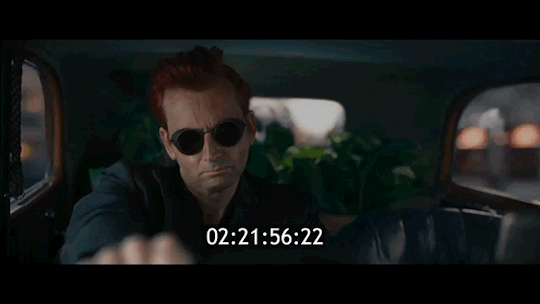
Even though there are large swathes of the second season with no music, there is a constant tempo weaving its way through the show: What if the seconds ticking by in the runtime itself was the music? Here’s an example of what I found. Behold a supercut of every single time Shax shows up, or Hell is mentioned in series 2 in the ineffable edit. They always arrive on a 6 in the time stamp (ex: 00:XX:X6).
(SOUND ON is an absolute must here, otherwise you won't hear any of the triggers)
Shax rings Crowley on a XX:X6. Shax miracles herself into the car on a XX:X6. Shax knocks on windows on a XX:X6. Shax’s big scary moment at the bookshop happens at 66 minutes exactly (lol). Crowley calls out for Shax on a XX:X6. Beelzebub starts spewing flies on a 6. People mention hell and it’s always on XX:X6 etc. etc…(Bonus: I also left in Maggie flipping the damned the double-bird on a XX:X6) I’ve also left in the only appearance of Shax or hell at all in the whole series that isn’t tied to a six: the park bench scene with Crowley. Shax seems to be off by one line, showing up on a XX:10, then back to XX:X6 on her second reply: “Bills, mostly”. I can only theorise that this scene, while technically in season 2, is not supposed to *be* in season 2 (even just judging by the trees, sun and the overcoats, it’s not summer like in the rest of the season). And it’s not only sixes! Every time I go through I find more and more little beats that line up exactly with ineffable timings. I can only do one video per post, so I’ll have to cut it up into sections, but Gabriel, doors, car horns, bird calls, Aziraphale, food, drinks, Angels, dialogue, Maggie, Nina, jokes, clocks, bells… The list goes on and on.
Neil called this season “The bridge”
Because we all know how much Neil loves double meanings and wordplay, I just have to ponder the idea that when Neil said this season was “the bridge” between seasons 1 and 3, he meant it double-literally. First, as in the bridge Aziraphale and Crowley have to cross in order to get them into position for the second coming. We even see the physical manifestation of this bridge leading everyone in the background of the opening credits. But this season is also a bridge in the sense that it’s a musical section that introduces new ideas or material in the middle of a song. This whole season is the music that deviates from the familiar, and re-contextualizes the chorus and the verses so we can appreciate them in a new way.
Let’s not forget that 2:22 is also exactly the same timing as this (and only this) track from the good omens s2 album (read all about the soundtrack here):

Why is this so bonkers? I think GOS2 might be the first ever “Total” series of television.
Having everything in the series timed and choreographed would actually make it a very faithful adaptation of the Powell & Pressburger film The Tales of Hoffmann (read about the movie and it’s effect on all of s2 here). If you watch the tales of Hoffman, you will realize that the entire film is actually done more like animation, with the music and vocals all performed in a studio, mixed and edited first, and then the actors came back to act out their choreographed and lip-synched parts for the cameras afterwards. The result is "Total film": a movie that feels more like a ballet, with every movement, action, and line happening in time with the music. As far as I can tell, very few films have ever attempted this, with The Tales of Hoffmann and Playtime being the only two “complete” films I could find in this style. (The Red shoes has one section, and An American In Paris has a few)
“Why would ambitious filmmakers simply film an opera? Many admirers of the work of Michael Powell and Emeric Pressburger have assumed that their decision to make The Tales of Hoffmann (…) was in some way an admission(…) that they couldn’t go on making their edgy, over-the-top melodramas after the rejection and interference they’d suffered, (but) there’s a case for considering The Tales of Hoffmann as one of the finest and boldest works that Powell and Pressburger produced, so far ahead of its time as a wholly “composed” film... Late in his life, Powell himself said that he thought it was one of the best films that he and Pressburger had made.” - Criterion review, Tales of Hoffmann
Here’s a simple example from An American in Paris
youtube
If season 2 *is* scripted and choreographed to line up with specific timings, I’m pretty sure that would make this the first ever “total” or “composed” season of television ever attempted. Not only does this take an ASTOUNDING amount of planning, scripting and editing finesse, not to mention a completely controlled set, it takes a real understanding of how to perform as an actor using rhythm and metre, which would go a long way to explain why all of the main actors coming back for season 2, with the exception of John Hamm, are well regarded theatre performers, (especially of Shakespeare).
I’ll leave you with one last surprise I found in the discovery of the ineffable edit: remember Aziraphale’s smile at the very end if the credits? It happens on 02:23:03, as the first step off the bridge, and into season 3.
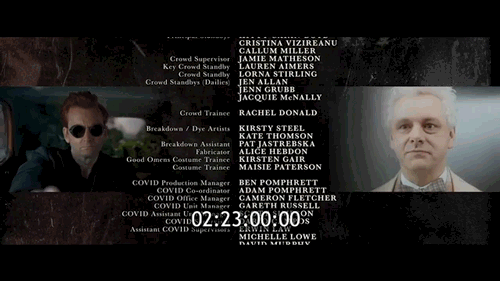
I will have much more in the next ineffable timeline post. Stay tuned…
__________________________________________
Thanks for reading all the way to the end. It’s taken me a solid month to get this perfect. There are so many hidden cuts and jumps to take into account, and I had a frame rate issue that kept exporting to 29fps instead of 25fps, but I’ve finally nailed the ineffable timeline enough that I am confident sharing in it.
Credits to @thebluestgreen and @embracing-the-ineffable for all the support and help with editing and just general good vibes.
#good omens#good omens runtime#good omens timefucks#good omens as opera#good omens s2 as a musical and narrative bridge
498 notes
·
View notes
Text
Some very interesting meta. I have read about the carpets before, but not about the music.
5 Good Omens Timefucks that Haunt Me
1.


Why is this here? Why is this line included? Is it just to add texture, to imply that larger world of corporate fascism of which Crowley and Aziraphale are subjects and victims and little worker bees? If so, why "They've started early" specifically? Why not "I wouldn't have expected that shrub to be the first to go" or "Aw, I liked that rock formation"?
Crawly doesn't make this comment in an offhand way: he sounds a bit taken aback and not thrilled that things have kicked off sooner than he anticipated. But it doesn't ultimately seem to make any difference to this scene, so why do we, the audience, need to know Hell started early?
2.


This one I'm not as confident will turn out to be significant, because iirc it appears in the book, which was a complete story when written, and because it serves a narrative purpose: it puts Agnes Nutter in charge of the situation, not her murderers. By backfooting Witchfinder Major Pulsifer, Agnes startles him enough she's able to walk past him without Pulsifer seizing her and discovering the extra 80 lbs of gunpowder and roofing nails in her skirts.
But. Agnes Nutter's sense of time is Nice and Accurate, and she notices the witchburning party are late and remarks on it to herself before she says anything to Pulsifer. So assuming a few minutes to position Agnes, tie her to the stake, and read the charges and conviction against her, Pulsifer and Agnes' neighbors are 12-15 minutes later than they should be. Why?
If the book answers this question, I don't recall; the show does not. And again, it seems to make no ultimate difference to this scene.
I'm not saying this was even purposely included in S1 as a timefuck. I am suggesting that as Gaiman seems to be fucking with time or timelines in this story, even if he and Pratchett didn't plan it like this when discussing the sequel, a retcon is hardly out of the question.
3.

As others have pointed out, Shostakovich's Symphony No. 5 is 45-55 minutes long. If you're listening to it on 78s instead of LPs because you are a CRAZY PERSON, it's going to take you more like 1 hour 5 minutes, because one side of a 78 holds, at most, 5 minutes of music, so every 5 minutes you have to get up and flip or switch the record.
Shostakovich wrote his 5th symphony in response to criticism in the state newspaper (possibly penned by Stalin himself) that his previous work didn't suck the Communist Party's dick hard enough--the kind of criticism that put him in danger of being sent to prison or killed. At the time it was first performed in 1937, Symphony No. 5 was considered a massive triumph, walking the line perfectly between Shostakovich's artistic standards and the Communist Party's demands of him.
The choice is symbolically significant, but it's a symphony, so whoever's censoring it isn't censoring lyrics or information. Again, why? Why is a 45-55-minute symphony only 21 minutes long? What did the time thief do with the 24-34 minutes?
4.
Here's the rug that covers the portal to Heaven in Episode 1:

Here's the rug in Ep. 2:

Aziraphale does not change this rug for the party. We know this bc we see it in Episode 5 when Mrs Sandwich enters the bookshop and the party is in full swing:

Now here's Aziraphale moving the circular rug to expose the portal to Heaven:

But here's Crowley, putting the rug back:

Why are there two different rugs?
5.
Every end credits track has the first line of "Everyday" embedded in it But after the line from "Everyday," at the end of Episode 4, the theme skips three twice like a vinyl record, and then is stopped by whoever controls the turntable and restarted, with several seconds of music having been skipped over.
This is not the first time it has mattered to a character in Good Omens what we in the audience see and hear. I argue here that God asks Aziraphale what he did with the flaming sword She gave him in order to show us the audience who Aziraphale is. God also addresses us the audience directly in S1, not only narrating about characters omnisciently but speaking to us about Herself in first person.
Now we evidently have a second character who has gone meta and is changing what we the audience experience of this story, and--indications are good--the story itself.
665 notes
·
View notes